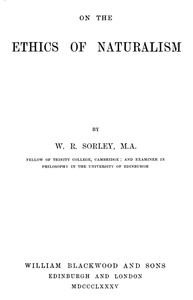On the Ethics of Naturalism by W. R. Sorley
"On the Ethics of Naturalism" by W. R. Sorley is a philosophical work written in the late 19th century. This text presents a series of lectures examining the foundations of ethics from a naturalistic perspective, emphasizing the interplay between theoretical philosophy and ethical inquiry. It seeks to explore fundamental questions about human conduct, ethics, and the nature of moral sentiments, primarily focusing on how these concepts are intertwined with human nature and
experience. At the start of the work, the author introduces the relationship between ethics and theoretical philosophy, suggesting that ethical doctrines stem from metaphysical and psychological foundations. Sorley outlines various viewpoints that shape ethical understanding, such as teleological and empirical approaches. He emphasizes the need to rigorously question the ethical ends that humans strive for, positing that these ends must not merely be transient feelings but should reflect deeper moral truths established through rational inquiry. The introductory chapter sets the stage for a detailed exploration of individualistic theories, psychological hedonism, and the potential transitions toward utilitarianism, indicating a comprehensive examination of ethical principles grounded in human nature and its interaction with surrounding environments. (This is an automatically generated summary.)
Read or download for free
| How to read | Url | Size | |||
|---|---|---|---|---|---|
| Read now! | https://www.gutenberg.org/ebooks/48027.html.images | 680 kB | |||
| EPUB3 (E-readers incl. Send-to-Kindle) | https://www.gutenberg.org/ebooks/48027.epub3.images | 268 kB | |||
| EPUB (older E-readers) | https://www.gutenberg.org/ebooks/48027.epub.images | 282 kB | |||
| Kindle | https://www.gutenberg.org/ebooks/48027.kf8.images | 463 kB | |||
| older Kindles | https://www.gutenberg.org/ebooks/48027.kindle.images | 432 kB | |||
| Plain Text UTF-8 | https://www.gutenberg.org/ebooks/48027.txt.utf-8 | 542 kB | |||
| Download HTML (zip) | https://www.gutenberg.org/cache/epub/48027/pg48027-h.zip | 251 kB | |||
| There may be more files related to this item. | |||||
Similar Books
About this eBook
| Author | Sorley, W. R. (William Ritchie), 1855-1935 |
|---|---|
| LoC No. | 09033062 |
| Title | On the Ethics of Naturalism |
| Credits |
Produced by Charlene Taylor, Marilynda Fraser-Cunliffe, JoAnn Greenwood and the Online Distributed Proofreading Team at http://www.pgdp.net |
| Reading Level | Reading ease score: 51.6 (10th to 12th grade). Somewhat difficult to read. |
| Language | English |
| LoC Class | BJ: Philosophy, Psychology, Religion: Ethics, Social usages, Etiquette, Religion |
| Subject | Ethics |
| Subject | Ethics, Evolutionary |
| Category | Text |
| EBook-No. | 48027 |
| Release Date | Jan 19, 2015 |
| Copyright Status | Public domain in the USA. |
| Downloads | 170 downloads in the last 30 days. |
| Project Gutenberg eBooks are always free! | |

